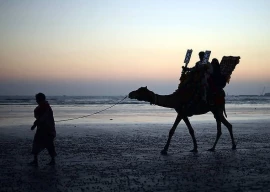
One year ago, Haseena Mai was a maid. Today, she has a poultry farm and earns Rs30,000 a month.
Last year’s floods were a blessing in disguise for some people, and Haseena is one of them.
(Read: Taken by the cruel water, ‘Still alive in our hearts and minds’)
A widow and mother of three, Haseena lost her house in the worst floods in Pakistan’s history that affected around 20 million people. As assistance, she was given 50 hens with three months of feed from a non-governmental organisation (NGO). By the time the water receded, the hens were big enough to lay eggs. Haseena then sold the eggs, bought more feed and eventually more hens. She now owns a small poultry farm and earns around Rs30,000.
A resident of Muzaffargarh, Haseena has become an inspiration for the men and women in her area, but she is not alone in her success. There are others who did not give up when faced with the disaster and fought for a better life when everything was lost.
Several acres of Rana Mumtaz Ali’s agricultural land were lying barren because of salinity in Daira Dir Panah, when the floods brought fertile soil to his land. The once barren land produced 1,760 kilogrammes of wheat per acre this year. “The crop is so thick now that even a snake cannot slither into it,” Khan told The Express Tribune. “Around 100 acres of land in Daira Dir Pana has become fertile,” he said.
An area of around 15 kilometres of infertile land from Shanawan to Mahmood Kot can now be cultivated. “Wheat production per acre before the floods was around 2,200 kilogrammes (kgs), which has now increased to 2,600 kgs per acre,” Muhammad Sharif, a farmer in Jampur area of district Rajanpur said.
Floodwater lakes
Floodwater lakes have also provided livelihood to people. A lake near Abbas Wala Band, close to Kot Addu is abundant with fish. “With no effort, I can catch up to 15 kilogrammes of fish. This lake, made after last year’s flood has proved to be a blessing,” said Jamshed, a resident in the area.
The Fisheries Department of Punjab controls some 300 water bodies across Punjab that fish farmers can lease for three years by an auction. According to the Fisheries Department, the number of water bodies leased has risen by 30 per cent after the floods.
Published in The Express Tribune, August 10th, 2011.
COMMENTS (4)
Comments are moderated and generally will be posted if they are on-topic and not abusive.
For more information, please see our Comments FAQ









































@Majid Mirza ya dear different NGOs like Diakonie katastrophenhilfe,Taangh wasaib organization sargodha, look saangh layyah, PWS Layyah, sungi foundation all these are doing work regarding this
Blessing in disguise!
Hello:
The livelihood enhancement through chickens seems like an excellent idea. Would anyone know which NGO did this project?
Regards,
Majid.
Its heartening to hear some good news out of the ol' Motherland once in a while. Man, I miss Pakistan sometimes...